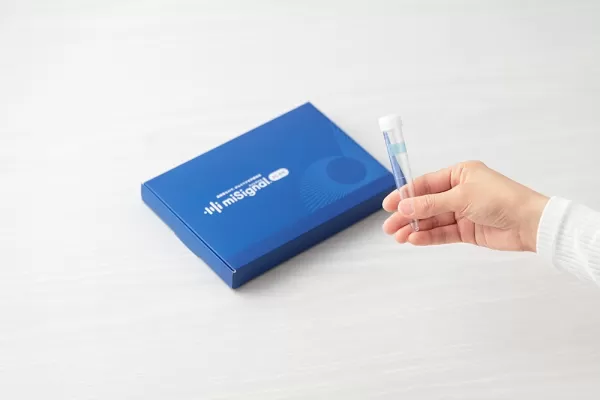Early cancer detection startup Craif raises $22M

Cancer's Global Impact and the Rise of Early Detection Technologies
Cancer remains one of the leading causes of death worldwide, with the National Cancer Institute reporting nearly 20 million new cases and 9.7 million deaths due to cancer in 2022. Projections suggest a stark increase to 29.9 million new cases by 2040, underscoring the urgent need for effective solutions.
In response to this global challenge, Craif, a startup spun off from Nagoya University in Japan in 2018, is making strides in early cancer detection. The company recently raised $22 million in its Series C funding round, led by existing investor X&KSK, to expand into the U.S. market and enhance its research and development efforts. This brings Craif's total funding to $57 million, with new investors including the U.S.-based Unreasonable Group, marking its first investment in a Japanese startup, along with TAUNS Laboratories, Daiwa House Industry, and Aozora Bank Group. The funding round valued Craif at just under $100 million, as shared by co-founder and CEO Ryuichi Onose in an interview with TechCrunch.
A Personal Mission Fuels Innovation
Craif's journey began with a deeply personal motivation for Onose, whose grandparents were diagnosed with cancer. This experience drove him to co-found Craif with Takao Yasui, an associate professor at Nagoya University, shortly after they met. Yasui had developed a groundbreaking method for early cancer detection using urinary biomarkers, which became the foundation of Craif's technology.
Onose highlighted the challenges of traditional diagnostic methods, such as blood tests, which can be invasive and deter individuals from regular screening. Additionally, limited access to medical facilities can hinder timely cancer testing. Craif aims to bridge these gaps with a non-invasive urine-based test that can detect cancer at an early stage, even at Stage 1.
The Power of MicroRNA and Urine-Based Testing
Craif's approach leverages microRNA (miRNA) as a biomarker, a choice that sets it apart from competitors who typically use cell-free DNA (cfDNA). Onose noted that miRNA, which gained significant attention after being linked to the 2024 Nobel Prize, is deeply involved in cancer biology from the earliest stages. Unlike cfDNA, miRNA is proactively secreted by early cancer cells, making it ideal for early detection.
Another distinctive feature of Craif's technology is its use of urine, which Onose described as easy and non-invasive. Urine has fewer impurities than other samples, providing clearer biomarker signals and reducing measurement errors, such as those caused by hemolysis in blood samples. This also leads to cost savings on testing.
Market Presence and Future Aspirations
Craif's flagship product, miSignal, is already generating revenue in Japan by detecting the risk of seven different cancers (pancreatic, colorectal, lung, stomach, esophagus, breast, and ovarian) using urinary miRNA. The product is distributed through clinics, pharmacies, direct-to-consumer sales, and corporate wellness programs, offering diverse revenue streams that can be scaled up.
Onose revealed that Craif is partnered with over 1,000 medical institutions and about 600 pharmacies in Japan, serving approximately 20,000 users. The company employs 73 dedicated staff members and offers both single tests and subscription packages, with many users opting for the latter. In 2024, Craif generated $5 million in revenue and aims to reach $15 million by year's end.
Looking ahead, Craif plans to expand miSignal to detect ten different types of cancers this year and is preparing to use its technology for early detection of non-cancerous diseases, such as neurodegenerative disorders like dementia.
Expansion into the U.S. Market
To support its U.S. expansion, Craif has established an R&D lab in Irvine, California, and plans to open an office in San Diego for business operations. The recent funding will facilitate the introduction of its microRNA-based early cancer detection test to the U.S. market, with trials expected to be completed around 2029 and subsequent filing for FDA approval.
Craif has already started collecting pancreatic cancer samples in collaboration with 30 medical institutions across 15 U.S. states, marking a significant step toward its U.S. market entry.
Related article
 AI Reimagines Michael Jackson in the Metaverse with Stunning Digital Transformations
Artificial intelligence is fundamentally reshaping our understanding of creativity, entertainment, and cultural legacy. This exploration into AI-generated interpretations of Michael Jackson reveals how cutting-edge technology can breathe new life int
AI Reimagines Michael Jackson in the Metaverse with Stunning Digital Transformations
Artificial intelligence is fundamentally reshaping our understanding of creativity, entertainment, and cultural legacy. This exploration into AI-generated interpretations of Michael Jackson reveals how cutting-edge technology can breathe new life int
 Does Training Mitigate AI-Induced Cognitive Offloading Effects?
A recent investigative piece on Unite.ai titled 'ChatGPT Might Be Draining Your Brain: Cognitive Debt in the AI Era' shed light on concerning research from MIT. Journalist Alex McFarland detailed compelling evidence of how excessive AI dependency can
Does Training Mitigate AI-Induced Cognitive Offloading Effects?
A recent investigative piece on Unite.ai titled 'ChatGPT Might Be Draining Your Brain: Cognitive Debt in the AI Era' shed light on concerning research from MIT. Journalist Alex McFarland detailed compelling evidence of how excessive AI dependency can
 Easily Generate AI-Powered Graphs and Visualizations for Better Data Insights
Modern data analysis demands intuitive visualization of complex information. AI-powered graph generation solutions have emerged as indispensable assets, revolutionizing how professionals transform raw data into compelling visual stories. These intell
Comments (0)
0/200
Easily Generate AI-Powered Graphs and Visualizations for Better Data Insights
Modern data analysis demands intuitive visualization of complex information. AI-powered graph generation solutions have emerged as indispensable assets, revolutionizing how professionals transform raw data into compelling visual stories. These intell
Comments (0)
0/200

Cancer's Global Impact and the Rise of Early Detection Technologies
Cancer remains one of the leading causes of death worldwide, with the National Cancer Institute reporting nearly 20 million new cases and 9.7 million deaths due to cancer in 2022. Projections suggest a stark increase to 29.9 million new cases by 2040, underscoring the urgent need for effective solutions.
In response to this global challenge, Craif, a startup spun off from Nagoya University in Japan in 2018, is making strides in early cancer detection. The company recently raised $22 million in its Series C funding round, led by existing investor X&KSK, to expand into the U.S. market and enhance its research and development efforts. This brings Craif's total funding to $57 million, with new investors including the U.S.-based Unreasonable Group, marking its first investment in a Japanese startup, along with TAUNS Laboratories, Daiwa House Industry, and Aozora Bank Group. The funding round valued Craif at just under $100 million, as shared by co-founder and CEO Ryuichi Onose in an interview with TechCrunch.
A Personal Mission Fuels Innovation
Craif's journey began with a deeply personal motivation for Onose, whose grandparents were diagnosed with cancer. This experience drove him to co-found Craif with Takao Yasui, an associate professor at Nagoya University, shortly after they met. Yasui had developed a groundbreaking method for early cancer detection using urinary biomarkers, which became the foundation of Craif's technology.
Onose highlighted the challenges of traditional diagnostic methods, such as blood tests, which can be invasive and deter individuals from regular screening. Additionally, limited access to medical facilities can hinder timely cancer testing. Craif aims to bridge these gaps with a non-invasive urine-based test that can detect cancer at an early stage, even at Stage 1.
The Power of MicroRNA and Urine-Based Testing
Craif's approach leverages microRNA (miRNA) as a biomarker, a choice that sets it apart from competitors who typically use cell-free DNA (cfDNA). Onose noted that miRNA, which gained significant attention after being linked to the 2024 Nobel Prize, is deeply involved in cancer biology from the earliest stages. Unlike cfDNA, miRNA is proactively secreted by early cancer cells, making it ideal for early detection.
Another distinctive feature of Craif's technology is its use of urine, which Onose described as easy and non-invasive. Urine has fewer impurities than other samples, providing clearer biomarker signals and reducing measurement errors, such as those caused by hemolysis in blood samples. This also leads to cost savings on testing.
Market Presence and Future Aspirations
Craif's flagship product, miSignal, is already generating revenue in Japan by detecting the risk of seven different cancers (pancreatic, colorectal, lung, stomach, esophagus, breast, and ovarian) using urinary miRNA. The product is distributed through clinics, pharmacies, direct-to-consumer sales, and corporate wellness programs, offering diverse revenue streams that can be scaled up.
Onose revealed that Craif is partnered with over 1,000 medical institutions and about 600 pharmacies in Japan, serving approximately 20,000 users. The company employs 73 dedicated staff members and offers both single tests and subscription packages, with many users opting for the latter. In 2024, Craif generated $5 million in revenue and aims to reach $15 million by year's end.
Looking ahead, Craif plans to expand miSignal to detect ten different types of cancers this year and is preparing to use its technology for early detection of non-cancerous diseases, such as neurodegenerative disorders like dementia.
Expansion into the U.S. Market
To support its U.S. expansion, Craif has established an R&D lab in Irvine, California, and plans to open an office in San Diego for business operations. The recent funding will facilitate the introduction of its microRNA-based early cancer detection test to the U.S. market, with trials expected to be completed around 2029 and subsequent filing for FDA approval.
Craif has already started collecting pancreatic cancer samples in collaboration with 30 medical institutions across 15 U.S. states, marking a significant step toward its U.S. market entry.
 AI Reimagines Michael Jackson in the Metaverse with Stunning Digital Transformations
Artificial intelligence is fundamentally reshaping our understanding of creativity, entertainment, and cultural legacy. This exploration into AI-generated interpretations of Michael Jackson reveals how cutting-edge technology can breathe new life int
AI Reimagines Michael Jackson in the Metaverse with Stunning Digital Transformations
Artificial intelligence is fundamentally reshaping our understanding of creativity, entertainment, and cultural legacy. This exploration into AI-generated interpretations of Michael Jackson reveals how cutting-edge technology can breathe new life int
 Does Training Mitigate AI-Induced Cognitive Offloading Effects?
A recent investigative piece on Unite.ai titled 'ChatGPT Might Be Draining Your Brain: Cognitive Debt in the AI Era' shed light on concerning research from MIT. Journalist Alex McFarland detailed compelling evidence of how excessive AI dependency can
Does Training Mitigate AI-Induced Cognitive Offloading Effects?
A recent investigative piece on Unite.ai titled 'ChatGPT Might Be Draining Your Brain: Cognitive Debt in the AI Era' shed light on concerning research from MIT. Journalist Alex McFarland detailed compelling evidence of how excessive AI dependency can
 Easily Generate AI-Powered Graphs and Visualizations for Better Data Insights
Modern data analysis demands intuitive visualization of complex information. AI-powered graph generation solutions have emerged as indispensable assets, revolutionizing how professionals transform raw data into compelling visual stories. These intell
Easily Generate AI-Powered Graphs and Visualizations for Better Data Insights
Modern data analysis demands intuitive visualization of complex information. AI-powered graph generation solutions have emerged as indispensable assets, revolutionizing how professionals transform raw data into compelling visual stories. These intell





























